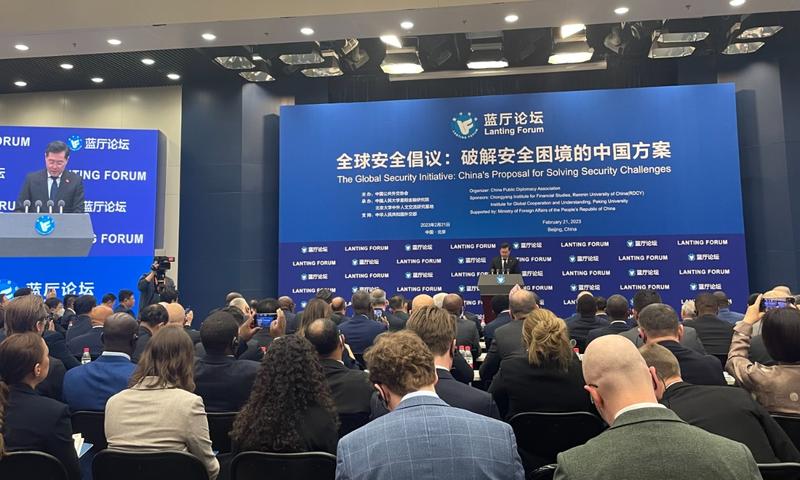 Chinese Foreign Minister Qin Gang delivers a keynote address on Feb 21, 2023, at the opening ceremony of a Lanting Forum marking the release of "The Global Security Initiative Concept Paper" in Beijing. (Chen Qingqing / Global Times)
Chinese Foreign Minister Qin Gang delivers a keynote address on Feb 21, 2023, at the opening ceremony of a Lanting Forum marking the release of "The Global Security Initiative Concept Paper" in Beijing. (Chen Qingqing / Global Times)
China’s foreign policy achievements since December 2022, when President Xi Jinping visited Saudi Arabia, are impressive. In addition to hosting summits in Riyadh during President Xi’s visit, the Saudis are reportedly considering accepting yuan as payment for oil. The much-discussed “petroyuan” could become a reality soon.
While the summits could have been held in different cities, China recognizes the Saudis as emerging major players, validating Saudi interests in dovetailing their Vision 2030 projects with those under the Belt and Road Initiative (BRI) and in joining BRICS+. Moreover, China had a broader plan involving the Saudis, culminating in presenting itself as mediator in Ukraine.
Wang Yi, director of the Office of the Central Commission for Foreign Affairs, attended the Munich Security Conference last month at which he met the Ukrainian Foreign Minister Dmytro Kuleba. Despite Western claims that China has not taken a position on the Russia-Ukraine conflict and has failed to condemn Russia’s actions, China has maintained dialogue with both countries, insisting that the war must not be prolonged at the expense of a peaceful political settlement. Furthermore, China not only has commercial investments in Ukraine predating the war, but Ukraine was a destination for BRI rail links. For economic and political reasons, Ukraine has relied on China to use its influence. Wang’s visit to Moscow after Munich to brief Russian President Vladimir Putin on the Ukrainian position was confirmation that Ukraine is open to Chinese mediation, helping to lay the groundwork for President Xi’s visit.
China’s Global Security Initiative (GSI) demonstrated a clear aversion to US unilateralism and a shift from the West-dominated “rules-based order” — the rules of which, as the Russians observed, have never been articulated. This is the basis upon which China will mediate in Ukraine, particularly the commitment to “indivisible security”, a concept flatly rejected by the West.
China presented its 12-point peace plan for Ukraine on Feb 24. The plan spoke for the Global South. US-instigated sanctions are not UN-backed and have been economically disruptive to emerging economies. The implied message was clear: Sanctions would be ignored; Russia would not be demonized.
The West dismissed the peace plan, claiming that it lacked substance and that China’s ties to Russia meant it was not impartial. However, every Western country, including Australia and New Zealand, plus Western allies such as Singapore, South Korea and Japan, supported sanctions against Russia. Some Central Asian states within the sphere of Russian influence also supported those sanctions. None of them can act as impartial mediators. This leaves a non-Western country like China, which took a measured view calling for a diplomatic resolution without publicly condemning Russia, or a Global South country that never supported the war, ignoring the sanctions but sustaining economic damage from the fallout for which they are justifiably angry.
China knew its initial presentation of the peace plan would be dismissed. It caught the West off-guard not in Ukraine, but in West Asia.
The implications of China brokering the resumption of diplomatic relations between Iran and Saudi Arabia this month are regional, covering Yemen, Syria, Lebanon and Bahrain. The accomplishment was recognized by former US secretary of state Henry Kissinger as changing the terms of reference in international diplomacy.
China therefore executed a West Asia peace plan presented as a bilateral road map for normalization. It gave China the international standing to present itself as a Russia-Ukraine mediator.
President Xi’s visit to Moscow and President Putin’s confirmation that the peace plan had been studied and Russia was open to peace talks formalized China’s legitimacy to mediate in Ukraine. Xi officially spoke for the Global South by referring to voices calling for peace and rationality, rejecting the Cold War mentality and unilateral sanctions. China’s call for dialogue was met with US declarations that a ceasefire in Ukraine would be rejected and more weapons would be shipped.
The US’ reliance on violence will limit its options, confirm its belligerent reputation and erode its global standing. China has offered rational diplomacy when Ukraine fatigue in the West has set in, whereas the West has no peace plan of its own other than perpetual war. The combined effect of China’s GSI and the Ukraine peace plan has been to checkmate the West. They have been exposed as the real drivers of the conflict even as Ukrainian President Volodymyr Zelensky welcomes Chinese mediation.
Moreover, the GSI proposed by China, which will form the basis for all its foreign policy initiatives, will be studied by the Global South. In the context of realpolitik, China’s actions since December 2022 have in effect isolated the West.
Zelensky will come to the negotiating table under Chinese mediation whether the West likes it or not. The war may end sooner rather than later.
The author is a Hong Kong-based lawyer who writes on geopolitics and digital economy.
The views do not necessarily reflect those of China Daily.


